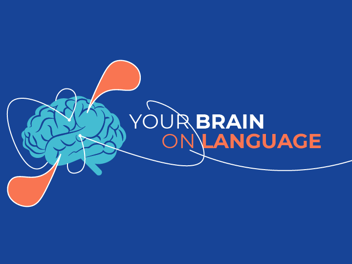When is it too late to learn a language?

Is it too late to learn a language? You’ve probably heard that the best time to learn a language is when you are young, preferably before turning 18. It is true that you might not pass for a native speaker if you start later. However, you can still acquire a level of proficiency that will allow you to connect successfully with people in their native tongue. If you are ready to get started on your journey, check out our language classes for mature adults.
When is it too late to learn a language?
So, is it too late to learn a language? Until recently, the foreign language learning community generally agreed on a “Critical Period” optimal for language learning which ranged from infancy to puberty, depending on the study (Singleton, 1995).
This idea of a critical period has been recently called into question (Hakuta, Bialystok, and Wiley, 2003). Learning scientists now suggest that the decline in one’s ability to learn a language after a certain age might not just be a matter of brain development. The learner’s level of formal education and the fact that adults have less time and fewer opportunities to dedicate to language learning might also delay the process. (Trafton, 2018). For example, most young adults focus on their careers and start a family. This leaves little time for the demanding tasks of learning a new language.
There is no question that it is best to start learning a second language at a young age, especially if you want to acquire native-like pronunciation. However, it does not mean that you cannot develop proficiency in a second language as an adult. Many people have become bilingual later in life, either by choice or by necessity.
Intensive Language Training
Case in point, ICLS offers intensive training to government agencies. Our student population ranges from the mid- 20s to mid-50s. Through intensive language training (up to 6 hours a day and for up to 55 weeks) and as evidenced by rigorous testing at the end of their program of study, our students reach professional levels of working proficiency in many foreign languages.
It is possible to learn a second language as an adult, and the discriminator seems to be time spent on a task rather than age. According to the Foreign Service Institute, the amount of time it takes to reach a certain level of proficiency varies by language. The page dedicated to this information however, does not mention age as a factor.
Is it Too Late to Learn a Language if You Are Older?
Older adults bring unique skills to the language learning table, including:
- Self-motivation: choosing to learn a language later in life usually comes from a desire to connect or reconnect with a language and culture that appeals to us instead of fulfilling a college requirement or a professional obligation.
- Self-regulation: with many learning experiences under their belts, older adults have usually developed a good understanding of how they learn best and can put this knowledge at the service of their language learning experience.
- Strong mastery of their first language: research shows that learners rely on their first language to learn a second language. A strong mastery of English will be an asset to your language learning efforts.
So now that we’ve established that age should not be a factor in your decision to learn a foreign language, what are the benefits of doing so?
Benefits of Learning a Language Later in Life
Research has now firmly established that learning a new language is good for your brain, especially at the executive function level (Shoghi & Ghonsooly). Learning a second language promotes cognitive agility and exercises your working memory.
The key to maintaining cognitive health over time is to engage in new intellectually demanding activities. As Carstensen explains, “When you perform well-ingrained tasks you don’t form new neural connections. It takes new learning to stimulate your brain in the way it needs to maintain optimal functioning. (…) Two excellent ways, cognitive scientists say, are learning to speak a new language or play an instrument.” (p281-283).
In addition to these cognitive benefits, learning a foreign language will open new doors and allow you to communicate with people from different cultures. This is especially useful if you like to travel. It will enable you to forge new meaningful friendships. As Nelson Mandela famously said, “If you talk to a man in a language he understands, that goes to his head. If you talk to him in his own language, that goes to his heart.”
Finally, learning a new language will allow you to get a new perspective on a new culture and a vantage point to examine your own. So, the word is out. When is it too late to learn a language? The answer is never, as long as you are willing to put the time and effort into it. If you are ready to get started on your journey, check out our language classes for mature adults.
Lifelong Learning at ICLS: Language classes for mature adults
Inspired to start your language-learning journey? Whether you’re looking to dip your toes into a new culture, prepare for an upcoming trip, or boost your professional skills, ICLS has a language class to help you become a lifelong learner! Our highly experienced, top-tier instructors will make sure you achieve your goals and have fun while doing so.
Our Lifelong Language Program offers 6-week online language classes for mature adults centered on travel and culture themes in French, Spanish, and Italian.
And if you’re looking for a more intensive experience, try our 10-week Online Group Language Courses. Choose between courses in Arabic, Chinese, French, Brazilian Portuguese, Russian, and Spanish.
If you have any questions, please don’t hesitate to contact Edwige Simon.
References
- The age factor in second language acquisition: a critical look at the critical period hypothesis. Clevedon [England]: Philadelphia. ISBN 978-1-85359-302-4. Singleton, David; Lengyel, Zsolt, eds. (1995).
- A Test of the Critical-Period Hypothesis for Second-Language Acquisition Kenji Hakuta,’ Ellen Bialystok,2 and Edward Wiley’ ‘Stanford-University and ‘York University, Toronto, Ontario, Canada, VOL. 14, NO. I, JANUARY 2003
- Cognitive scientists define critical period for learning language, Study shows children remain adept learners until the age of 17 or 18. Anne Trafton | MIT News Office, May 1, 2018
- Learning a Foreign Language: A New Path to Enhancement of Cognitive Functions, Sara Shoghi and Behzad Ghonsooly, 2018
- A Long Bright Future, Laura Carstensen, 2018.


